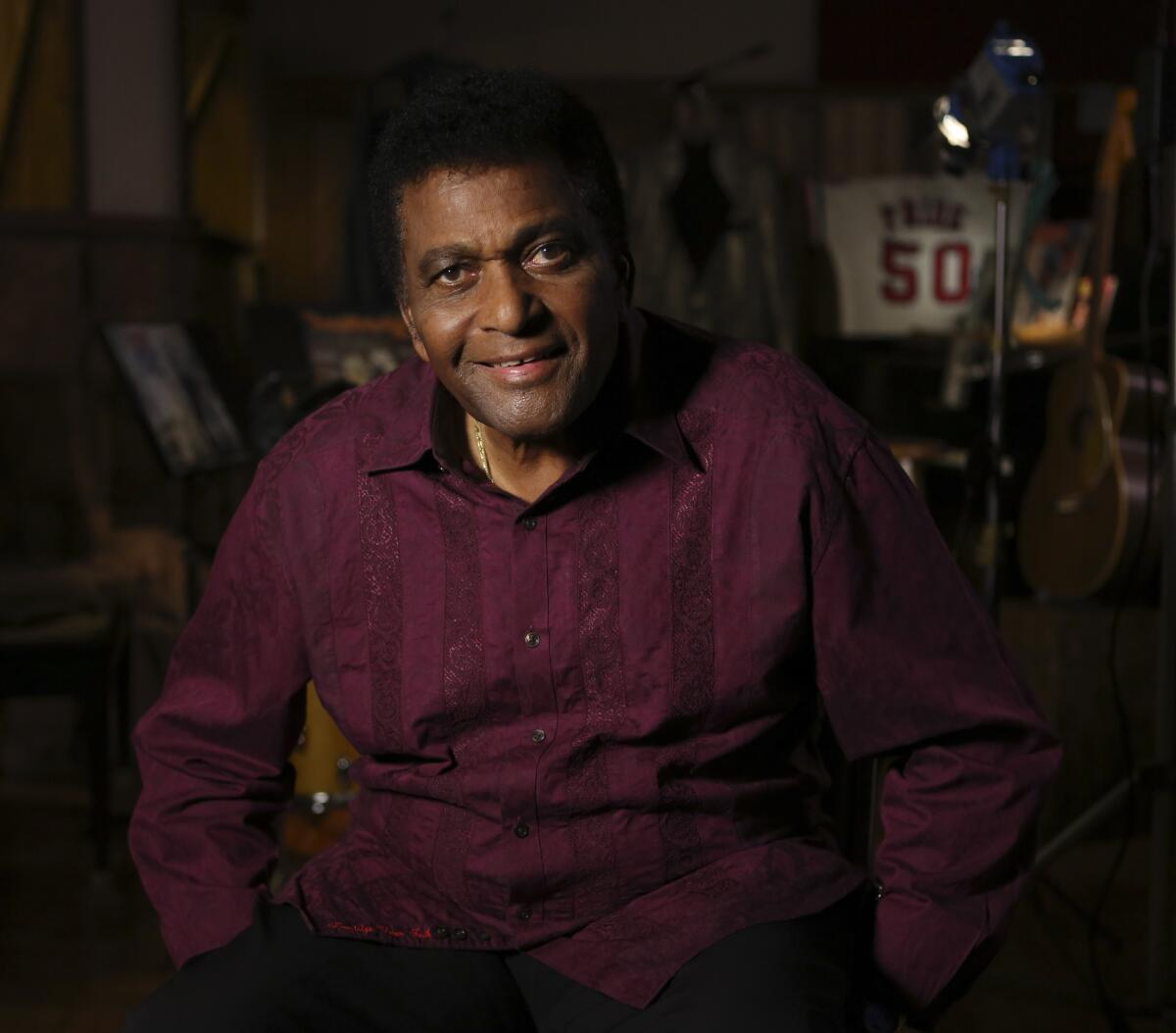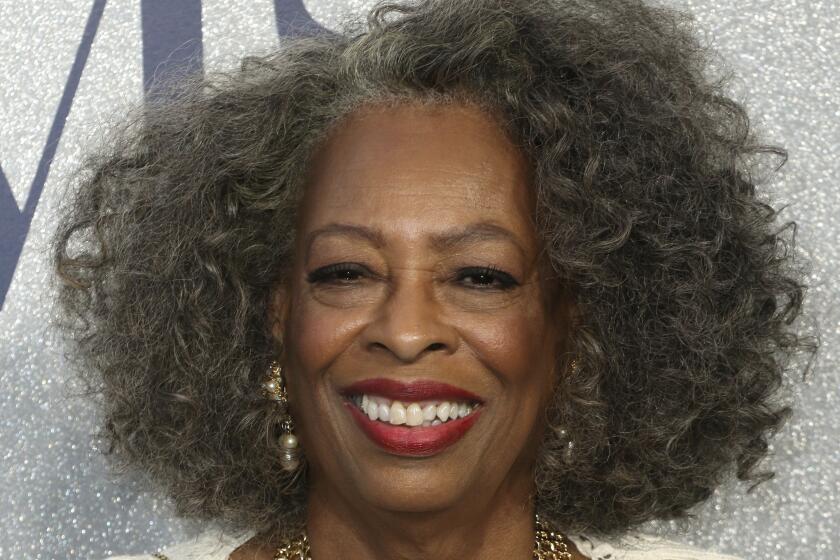Charley Pride, the ‘Jackie Robinson of country music,’ dies at 86 of COVID-19

- Share via
The guitar that changed his life cost $10 and came out of the Sears Roebuck catalog. Charley Pride was 14 at the time, one of 11 children of a sharecropper in Sledge, Miss., a cotton town in the Delta. With that guitar, he learned how to play the tunes he heard emanating from the Grand Ole Opry’s famed broadcasts on WSM Radio, inspired by country acts such the Louvin Brothers and Smilin’ Eddie Hill.
Country music was no ordinary path for a Black kid growing up in the segregated South. But Pride was never destined to be ordinary. In fact, his meteoric career was highly unlikely in an area of music that to this day remains overwhelmingly white.
Pride sold millions of albums, becoming country music’s first Black superstar. He was the first Black member of the Country Music Hall of Fame. The first — and still the only — Black musician to receive the Country Music Awards’ Entertainer of the Year award (back in 1971). And the first — and the only — Black entertainer to receive the CMA’s prestigious Willie Nelson Lifetime Achievement Award (presented last month).
“I get a lot of questions you know,” he told NPR in 2000, upon his induction into the Country Music Hall of Fame. “‘Charley, how’d you get into country music?’ And ‘Why you don’t sound like you’re supposed to sound?’ Well, it is a little unique, I admit, but I’ve been singing country music since I was about 5 years old, and this is what I sound like.”
Charley Pride, country music’s first Black star, spanned decades and styles during his Hall of Fame career. Here, 10 of his greatest recordings.
Pride, an entertainer known for his congenial manner, his smooth, baritone vocals on hits such as “Is Anybody Goin’ to San Antone” and dapper get-ups that eschewed all the tropes of country music (no rhinestones or 10-gallon hats for him), died Saturday in Dallas, his home since the 1970s.
The singer, 86, died of complications from COVID-19. His death was confirmed by a press representative.
As the news broke on Saturday, fellow country stars immediately took to Twitter to mourn his passing.
“I’m so heartbroken that one of my dearest and oldest friends, Charley Pride, has passed away,” tweeted Dolly Parton.
Reba McEntire wrote that Pride “will always be remembered for his great music, wonderful personality and his big heart.” Singer-songwriter Jason Isbell described it as “a sad day for American music.”
“To say Country Music has lost a trailblazer is an obvious understatement,” Country Music Assn. CEO Sarah Trahern said in a statement, “but in fact one of the biggest losses is Charley’s definitive Country voice.”
Pride’s last performance was at the Country Music Awards in November, where, in a blue suit, he crooned “Kiss An Angel Good Mornin’” with fellow musician Jimmie Allen.

His death, just one month after the awards show, led to speculation on social media about where Pride may have contracted the disease.
Country singer Mickey Guyton shared a broken heart emoji on Twitter upon hearing the news of Pride’s death. She followed that up with another Tweet: “We need answers as to how Charley Pride got covid.”
Times music critic Mikael Wood had criticized the show last month for seeming intent on avoiding the realities of the pandemic. At the indoor event, unmasked performers shared relatively intimate quarters with one another and their plus ones.
But mostly, Pride’s death was marked by reverent recollection. Documentarian Ken Burns, who interviewed Pride for his series “Country Music,” tweeted that the singer’s “remarkable voice & generous spirit broke down barriers in country music.”
Ironically, while music is how he is most likely to be remembered, in his early years, it didn’t seem as if it would ever amount to much more than a hobby. Pride spent much of his young adulthood pursuing a career as a baseball player in the Negro and minor leagues — but was ultimately sidelined by injuries. For a time, he worked in a Montana smelting plant. On the side, he would occasionally perform local club gigs.
These landed him on the line-up for a concert in Helena, Mont., in 1962, performing two songs: “Heartaches by the Number” and “Lovesick Blues.” It was where Pride’s musical fortunes began to change. The singer made an impression on Grand Ole Opry star Red Sovine, who suggested the young man take his talents to the Nashville music scene.
“Go to Nashville,” Pride recalls Sovine told him in his 1994 autobiography, “Pride: The Charley Pride Story.” “I don’t care what color you are.”
The suggestion would ultimately lead him to his longtime manager Jack Johnson, producer Jack Clement and a recording contract with RCA.
By 1967, Pride had broken into the country Top Ten with “Just Between You and Me.” In 1971, he would release the biggest hit of his career, the twangy “Kiss an Angel Good Mornin’,” which topped the country charts for five weeks and became a Top 40 hit.
Ultimately, Pride would land more than two dozen No. 1 hits on the Billboard country singles chart and become the second best-selling act of all time at RCA — outdone only by Elvis Presley.
For his achievements, he was frequently described as the “Jackie Robinson of country music” by the press. But, throughout his career, Pride often deflected questions about the significance of his race — with amiability and biting wit.
In a 2018 interview with Sports Illustrated, he said: “People used to ask me how it felt to be the first colored country singer. Then the first Negro country singer. Then the first black country singer. Then the first Afro-American country singer. And I always say, ‘Feels the same as it did when I was colored.’”
Charley Frank Pride was born in rural Sledge, Miss., on March 18, 1934, the son of Mack Pride Sr. and Tessie Stewart Pride. When the young Charley wasn’t in school, he was helping the family pick cotton.
While he developed an interest in music from an early age, he initially banked on baseball as a way out of farm labor.
“I saw Robinson get to the majors, and I said, here’s my way out of the cotton fields,” he told Sports Illustrated.
For a time, he pitched and played the outfield for the Memphis Red Sox, a Negro League club. In the early ’50s, he was signed by the New York Yankees’ Class C team in Boise, Idaho. But an arm injury prevented any advancement. He spent the subsequent years — into the early ’60s — bouncing around various leagues.
By 1963, he gave up the baseball and turned his attention to music. But he never gave up his love of the game, frequently turning up at the Texas Rangers’ spring camp in Arizona to train with the players (even at the age of 84). For the past decade, he was part of the team’s ownership group.
Pride is survived by his wife, Ebby Rozene Cohran Pride, three children — Carlton Kraig Pride, Charles Dion Pride and Angela Rozene Pride — as well as five grandchildren and two great grandchildren. He is also survived by four of his 10 siblings: Harmon Pride, Stephen Pride, Catherine Sanders and Maxine Pride.
Actor Carol Sutton, a fixture on stages in her native New Orleans who built a steady career on the big and small screens, has died of complications from COVID-19
More to Read
The biggest entertainment stories
Get our big stories about Hollywood, film, television, music, arts, culture and more right in your inbox as soon as they publish.
You may occasionally receive promotional content from the Los Angeles Times.












